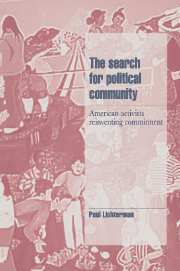Book contents
- Frontmatter
- Contents
- Acknowledgments
- 1 Personalism and political commitment
- 2 Personalized politics: the case of the US Greens
- 3 Speaking out in suburbia
- 4 Imagining community, organizing community
- 5 Culture, class, and life-ways of activism
- 6 Personalized politics and cultural radicalism since the 1960s
- 7 The search for political community
- Appendix I Choosing and studying the organizations
- Appendix II Why participant-observation was necessary
- Notes
- References
- Index
2 - Personalized politics: the case of the US Greens
Published online by Cambridge University Press: 23 January 2010
- Frontmatter
- Contents
- Acknowledgments
- 1 Personalism and political commitment
- 2 Personalized politics: the case of the US Greens
- 3 Speaking out in suburbia
- 4 Imagining community, organizing community
- 5 Culture, class, and life-ways of activism
- 6 Personalized politics and cultural radicalism since the 1960s
- 7 The search for political community
- Appendix I Choosing and studying the organizations
- Appendix II Why participant-observation was necessary
- Notes
- References
- Index
Summary
A PUZZLE
Advocates of public commitment would have found little to complain about at the general meetings of the Seaview Greens. At each general meeting, core Seaview Green members and new members deliberated on a topic of public interest that would enable participants to apply a “Green” perspective, and also decide Seaview policy on that topic. In the meeting sketched below, the Seaview Greens were deciding on endorsements of local candidates and ballot initiatives. The meeting displays a collective commitment to participation and debate that I observed throughout my two years of participant-observation in the US Green movement.
Few if any participants at this meeting would have opposed an environmental protection initiative that would impose strict limits on pesticides and off-shore oil drilling. The corporate-funded opposition had spent millions of dollars to defeat this initiative, while nearly every environmentalist group in the state supported it. Nevertheless, no one at the meeting seemed to think it a waste of time that one participant asked whether the complicated, costly initiative would not end up stalled in the courts were it to pass. The man mentioned that he himself supported the proposition but thought these cautions ought to be raised. The “facilitator,” the person responsible for moderating the group discussion, listened attentively and agreed that this would be important to keep in mind.
Boosterism for “our side” had not overshadowed the group's dedication to discussion. Several participants noted this emphasis on discussion in their evaluation of the meeting. One, a newcomer in her early twenties, said she appreciated that “people were not rigid in their values – it wasn't like talking to a brick wall.”
- Type
- Chapter
- Information
- The Search for Political CommunityAmerican Activists Reinventing Commitment, pp. 30 - 70Publisher: Cambridge University PressPrint publication year: 1996



